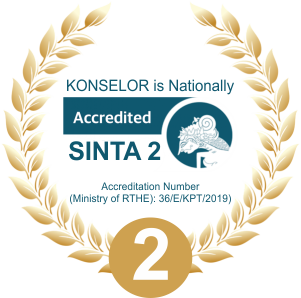KONTRIBUSI KONSEP DIRI DAN DUKUNGAN ORANGTUA TERHADAP MOTIVASI BELAJAR SISWA DAN IMPLIKASINYA DALAM PELAYANAN BIMBINGAN DAN KONSELING
 ), Mega Iswari(2), Mudjiran Mudjiran(3),
), Mega Iswari(2), Mudjiran Mudjiran(3), (1) Universitas Negeri Padang
(2) Universitas Negeri Padang
(3) Universitas Negeri Padang
 Corresponding Author
Corresponding Author
Copyright (c) 2017 Konselor
DOI : https://doi.org/10.24036/02016516477-0-00
Full Text:
 Language :
Language :
Abstract
The research was backgrounded by still low level of the learning motivation of students. The self-concept and parental support suspectted to affect the learning motivation of students. This research aims to describe : (1) the self-concepts, (2) parental support, (3) learning motivation of students, (4) the contribution of the self-concept toward the learning motivation of students, (5) the parental support contributions toward the learning motivation of students, and (6) the contribution of self-concept and parental support together against to the learning motivation of students. This study used a descriptive correlational quantitative method. The population of this research was students of SMA Negeri 8 Padang in class XI and XII which totaled 464 people. The number of samples are 215 people, selected by proportional stratified random sampling technique. The instrument used is the scale. Results validity and reliability of the instrument self-concept, parental support, and learning motivation of student stated that valid and reliable research instruments. Data were analyzed with descriptive statistics, simple regression, and multiple regression. The findings showed that: (1) the average description of self-concepts are in positive category, (2) an average description of parental support are in high category, (3) description of the learning motivation of students are in high category, (4) there is contribution of self-concept toward the learning motivation of students by 24.2%, (5) there is contribution of parental support toward the learning motivation of students by 18.8%, and (6) there are contributions of self-concept and parental support together toward the learning motivation of students amounted to 30.7%. Implications of the research results can be used as input to create a program of guidance and counseling services.
Keywords
References
Ahmadi, A. (1991). Sosiologi Pendidikan. Jakarta: Rineka Cipta.
Bahri, A., dan Corebima, A.D. (2015). “The Contribution of Learning Motivation and Metacognitive Skill on Cognitive Learning Outcome of Students within Different Learning Strategies”. Journal of Baltic Science Education, Vol. 14, No. 4: 487-500.
Biggs, B.J., dan Moore, P.J. (1993). “Process of Learning”. Melbourne: Prentice Hall
Bong, M., dan Clark, R.E. 1999. “Comparison between Self-Concept and Self-Efficacy in Academic Motivation Research”. Educational Psychologist, (Onlin), Vol. 34, Issue 3, (http://www.tandfonline.com/doi /abs/10.1207/s15326985ep3403_1, diakses 27 Juni 2015).
Dimyati dan Mujiono. (2009). Belajar dan Pembelajaran. Jakarta: Rineka Cipta.
Djamarah, S.B. (2011). Psikologi Belajar. Jakarta: Rineka Cipta.
Elmirawati, Daharnis, dan Syahniar. (2013). “Hubungan Antara Aspirasi Siswa dan Dukungan orangtua Dengan Motivasi Belajar Serta Implikasinya terhadap Bimbingan Konseling”. E-Journal Konselor, (Online), Vol. 2, No. 1, (http://ejournal.unp.ac.id/ index.php/konselor/article/view/871/726, diakses 2 Maret 2015).
Firdaus, N.A., Nugroho, A.H., dan Meydianasari, L. (2013). Hubungan Konsep Diri dengan Motivasi Belajar. Jurnal Keperawatan AKPER 17 Karanganyar (Online), Vol. 1, No. 1, (http://jurnal.akper17.ac.id/ index.php/JK17/article/ view/7/8, diakses 28 Oktober 2015)
Gunawan, A.W. (2005). Apakah IQ Anak Bisa Ditingkatkan dan Masalah-masalah Lain Seputar Pendidikan Anak yang Sering Dihadapi Orangtua dan Guru. Jakarta: Gramedia Pustaka Utama.
Hasan, M.I. (2010). Pokok-pokok Materi Statistik 2: Statistik inferensif. Jakarta: Bumi Aksara
Hasbullah. (2001). Dasar-Dasar Ilmu Pendidikan. Jakarta: RajaGrafindo Persada.
Hidayati, S. (2011). “Hubungan Dukungan Orangtua dengan Prestasi Belajar Siswa Kelas VII MTs AlMukarromin Wadak-Kidul Duduksampeyan Gresik”. Tesis tidak diterbitkan. Malang: Universitas Negeri Malang.
Iskandar. (2009). Psikologi Pendidikan: Sebuah orientasi baru. Ciputat: Gaung Persada.
Jahja, Y. (2011). Psikologi Perkembangan. Jakarta: Kencana Prenada Media.
Kraebber, S.L., dan Greenan, J.P. (2012). “The Relationship between Self-Concept and Self-Ratings of Generalizable Skills of Students in Postsecondary Career and Technical Programs”. Journal of Career and Technical Education, Vol. 27, No. 1.
Lumsden, L.S. (1994). “Student Motivation to Learn”. ERIC Learinghouse on Educational Management. (Online), http://people.ucsc.edu/~gwells/Files/ Courses_Folder/documents/ Lumsden.StudentMotivationToLearn.pdf, diakses 25 Februari 2015).
Manning, M.A. (2007). “Self-Concept and Self-Esteem in Adolescents”. National Association of School Psychologists, (Online), (www.naspcenter.org, diakses 3 Februari 2015).
Musbikin. I. (2012). Mengatasi Anak Mogok Malas Belajar. Yogyakarta: Laksana.
Ormrod, J. E. (2008). Educational Psychology. America: Pearson Education.
Prayitno, Wibowo, M.E., Marjohan, Mugiarso, H., dan Ifdil. (2014). Pembelajaran Melalui Pelayanan BK di Satuan Pendidikan. Padang: UNP Press.
Rahmi, A. (2012).“Konsep diri, Motivasi Belajar Siswa Membolos dan Implikasinya terhadap Layanan Bimbingan dan Konseling”. Tesis tidak diterbitkan. Padang: Program Pascasarjana UNP Padang.
Sanchez, F.J.P. dan Roda, M.D.S. (2003). Relationships between Self-concept and Academic Achievement in Primary Students. Electronic Journal of Research in Educational Psychology and Psychopedagogy. Vol. 1 No. 1, 95-20.
Santrock. (2003). Adolencence Perkembangan Remaja. Terjemahan oleh Achmad Chusairi dan Juda Damanik. Jakarta: Erlangga.
Sarafino, E.P. dan Smith, T.W. (2011). Health Psychology: Bio psychosocial interaction. New York: John Willey dan Sans Inc.
Slavin, R.E. (2011). Psikologi Pendidikan (Edisi Kesembilan Jilid 2). Terjemahan oleh Marianto Samosir. Jakarta: Indeks.
Steers, R.M. (1987). Motivation and Work Behavior. Singapore: Chong Moh.
Sunaryo. (2004). Psikologi untuk Keperawatan. Jakarta: EGC.
Syah, M. (2012). Psikologi Belajar. Jakarta: Rajawali Pers
Tan, J.H., Ismanto, A.Y., dan Babakal, A. (2013). “Hubungan antara Dukungan Orangtua dengan Motivasi Belajar pada Anak Usia Sekolah Kelas IV dan V di SD Negeri Kawangkoan Kalawat”. E-journal keperawatan (e-Kp). Vol. 1, No. 1: 1-8.
Tarmidi dan Rambe, A.R.R. (2010). “Korelasi Antara Dukungan Sosial Orangtua dan Self‐Directed Learning pada Siswa SMA”. Jurnal Psikologi, (Online). Vol. 37, No. 2, (http://jurnal.psikologi.ugm.ac.id/index.php/fpsi/ article/view/34, diakses 3 Maret 2015).
Undang-Undang Republik Indonesia Nomor 20 Tahun 2003 tentang Sistem Pendidikan Nasional. Jakarta: Kementerian pendidikan dan kebudayaan Republik Indonesia.
Uno, H.B. (2013). Teori Motivasi dan Pengukurannya Analisis di Bidang
Pendidikan (Cetakan ke-10). Jakarta: Bumi Aksara.
Waruwu, F.E. (2006). “Belajar dan Motivasi: Bagaimana Meningkatkan Motivasi Internal”. Jurnal Provitae, Vol. 2, No. 2: 21-25.
Widyawati, E. (2009). “Analisis Pengaruh Konsep Diri terhadap Motivasi Belajar Mahasiswa”. Jurnal Manajemen. Depok: Fakultas Ekonomi Jurusan Manajemen, 1-11.
 Article Metrics
Article Metrics
 Abstract Views : 2098 times
Abstract Views : 2098 times
 PDF Downloaded : 1407 times
PDF Downloaded : 1407 times
Refbacks
- There are currently no refbacks.
Copyright (c) 2017 Konselor







